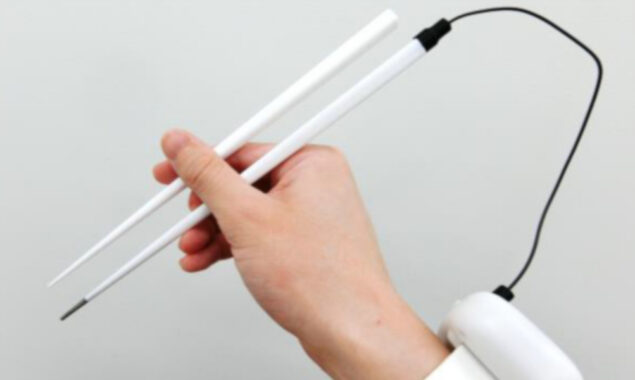US and Cuban officials to meet over migration
Officials from America and Cuban are expected to meet in Washington on...

There may soon be no need for diners in Japan to worry about their salt intake while eating ramen or miso soup.
In an effort to reduce the sodium content of some of the country’s most popular dishes, researchers have developed chopsticks that artificially produce the taste of salt.
The chopsticks are powered by electrical stimulation and a wristband-mounted computer.
Food and drink manufacturer Kirin collaborated with Meiji University in Tokyo to develop the device, which transmits sodium ions to the mouth via chopsticks and creates a salty sensation, says Meiji University professor Homei Miyashita.
According to the team, they plan on refining the prototype and selling the chopsticks to the general public by the end of the year.
Traditional Japanese diets tend to be high in salt due to the use of ingredients like miso and soy sauce, so the utensils could be well received.
The World Health Organization recommends that adults in Japan consume no more than 10 grammes of salt per day. The health ministry recommends that men and women consume no more than 7.5 grammes and 6.5 grammes of salt, respectively, per day.
For the sake of altering people’s perceptions of flavour, the chopsticks use “very weak electricity, not enough to affect the human body,” according to Kirin, in order to manipulate ions such as sodium chloride and sodium glutamate.
People on a low-sodium diet have confirmed that the device increases the saltiness of their food by about 1.5 times, according to Miyashita and Kirin. There had been a noticeable increase in “richness, sweetness, and overall tastiness” when participants were served low-salt miso soup.
High blood pressure, the leading cause of heart attacks and strokes, can be caused by a high salt intake.
According to Kirin researcher Ai Sato, “in order to prevent these diseases, we need to reduce the amount of salt we consume.” The pain of removing favourite foods from one’s diet or the blandness of bland food would have to be endured if one attempted to avoid taking less salt in the traditional manner.
A lickable TV screen that mimics the flavours of various foods was also developed by Miyashita’s lab, which is investigating new ways to engage the senses with technology.
Catch all the International News, Breaking News Event and Latest News Updates on The BOL News
Download The BOL News App to get the Daily News Update & Follow us on Google News.